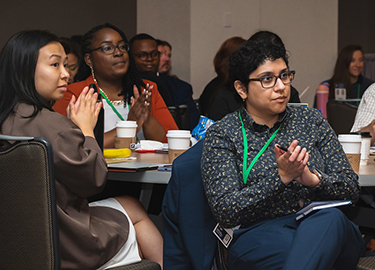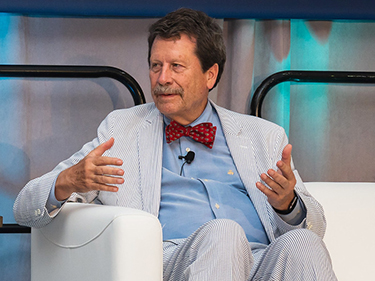Collaboration, tenacity and science-based data are important factors in successful advocacy for public health, speakers at APHA’s Policy Action Institute said Monday.
Experts at the sixth-annual event engaged participants on innovation, coalition building, public health policy and the workings of government. Sessions addressed health inequities and ways to develop productive relationships with decisionmakers. Throughout the event, vibrant dialogue between panelists and attendees was the norm.
Lori Fresina, MPP, national vice president and executive director of American Heart Association’s Voices for Healthy Kids, said advocates should ask themselves three key questions when formulating an advocacy approach.
“What do you want, why do you want it and who has the power to give it to you?” Fresina told a sold-out event in Washington, D.C., with hundreds more watching online. “Pressure and influence people in power to give you what you want.”
Marc Morial, JD, president and CEO of the National Urban League, encouraged public health workers to be “champions of veracity” in the face of misinformation, which has accelerated during the COVID-19 pandemic.
Misinformation about systemic racism, LGBTQ+ health, disparities, vaccines and more have all proliferated in the public square. Public health advocates are working to cut through the noise, especially because so many public health issues are on state ballots this year. Morial encouraged everyone to vote, even if the best candidate is not ideal.
“Defend American democracy, not because it is perfect, but because it is better than authoritarianism,” Morial said. “And push back on voter suppression and all the mendacity around the issue.”
A lot of public health advocacy is aimed at Congress, but federal agencies should be approached as well, speakers said. The U.S. Food and Drug Administration, which regulates 20% of the U.S. economy, can seem unapproachable when it comes to public health advocacy. But FDA Commissioner Robert Califf, MD, said that is not the case. Advocates are welcome to present evidence-based research on topics that the agency addresses, such as medications or tobacco regulation.
“When we have a consensus in the field, we can take action at FDA,” Califf said.
Institute participants said they were eager to learn about current issues in public health policy, and pick up tips for their work as well as make new connections.
“Policy’s important to public health because it is considered one of the spokes in the wheel in addressing health inequities at large,” said participant Syreen Goulmamine, MPH, who added she was particularly interested in housing and food insecurity.
Stephen Modell, MD, MS, chair of APHA’s Action Board and was attending the institute for the third year, said he learns something new each time he attends the event.
He advised public health supporters who are new at advocacy to start at home with topics that are personal to them. And it is not just new policies that need attention, he stressed: Advocacy ensures that existing policies are funded and implemented in ways that benefits public health.
“Health policy doesn’t come about magically,” said Modell, who teaches policy at the University of Michigan School of Public Health. “They can play a part in it.”
Fresina said public health professionals should join local commissions and councils to ensure public health is at the table of power.
“Sit at those tables, even when we are placeholders for sanity,” Fresina said. “Don’t wait to be the grownup at the table. Be it now.”
Top photo: The Policy Action Institute in Washington, D.C., was sold out, while hundreds more watched online. Bottom: FDA Commissioner Robert Califf speaks at the event. Photos courtesy Gayatri Malhotra.